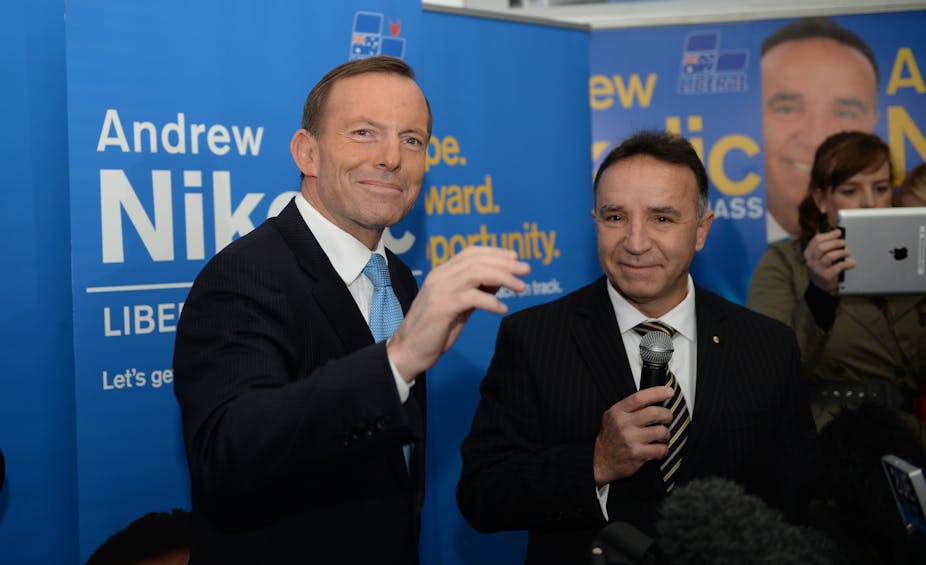If the early polls were accurate, Bass was already lost for Labor’s Geoff Lyons, the sitting member, but recent gaffes by Lyons will probably make that certain.
Lyons has been left with egg on his face after he thought it might enhance his election prospects if he questioned the military record of his Liberal opponent, Andrew Nikolic. Lyons suggested Nikolic had been a “bureaucrat” in Canberra for “the last 25 years”, and had “misled” the media about his military service.
Nikolic, a former army brigadier, was Australia’s first armed forces commander in southern Iraq in 2005 in a distinguished military career. He was made a Member of the Order of Australia in 2010. Lyons apologised via the media, and Nikolic has been keen to report his opponent has failed to attend a number of debating forums in Bass since this error of judgement.
To add salt to an already gaping wound, the ABC reported that Lyons was forced to change his website after incorrectly claiming he held the Emergency Services Medal. He actually held the National Medal for his services as a surf lifesaver as well the Australian Government Sports Medal.
On his first campaign trip to Bass, opposition leader Tony Abbott declared that Bass was “vital” to a Coalition victory. He may not need to return to shore up Nikolic’s victory.
Prime minister Kevin Rudd might not see any value in pulling against gravity in Bass. The north and northeastern Tasmanian electorate of Bass, centred on the city of Launceston and stretching from the Tamar estuary to the northeast coast, still craves the sort of national attention and acclaim it once had as the famous by-election result that heralded the end of Gough Whitlam’s government in 1975.
Bass didn’t return a Labor member until 1993 when the swing in Tasmania – still on daylight saving time and an hour ahead of mainland counting – suggested an improbable win for Paul Keating’s Labor government.
Since 1993, only Labor’s Michelle O’Byrne has held the seat in successive elections (1998 and 2001). Liberal Michael Ferguson won the seat in 2004, Labor’s Jodie Campbell took it back in 2007 and Labor’s Geoff Lyons won in 2010.
If Nikolic wins in Bass – and no published polling suggests otherwise – it will be some accomplishment on the back of an appalling Tasmanian electoral performance by the Liberals at the 2010 election. Across Tasmania, the Liberal vote fell by 4.6% against a national swing against Labor of 5.4%.
Lyons is recontesting the seat on the back of a 5.7% swing to Labor in 2010 on a two-party-preferred vote basis. However, that comfortable margin doesn’t appear sufficient enough for Labor to retain the seat.
ReachTEL has conducted two polls in Bass for The Examiner newspaper this year: one in January and one in late July. The January poll suggested a 60-40 two-party-preferred win to the Liberals and the July poll reiterated that result with a 55-45 result.
Lyons and Nikolic will face off against five other hopefuls in Bass. Candidates from the Australian Christians, the Palmer United Party, Family First, the Greens and the Secular Party of Australia will contest the seat.
Bass is an electorate that has endured much of the Tasmanian socioeconomic uncertainty driven by a range of structural changes in key, traditional economy sectors such as forestry and manufacturing. The city of Launceston accounts for much of the economic activity in Bass, and recorded a loss of 432 jobs between the 2006 and 2011 Census periods. Much of this was attributable to job losses in forestry and manufacturing.
The flow-on and multiplier effect in a regional electorate with significant networks of employment connected to larger enterprise activity has been devastating, with the municipalities of Dorset and Break O’Day in the northeast of the electorate being particularly hard hit. Manufacturing in the Tamar Valley continues to decline with closures pending, such as car parts maker ACL Bearings in Launceston in 2014. There is also uncertainty about long term futures for Pacific Aluminium’s Bell Bay Plant and BHP’s TEMCO Manganese plant.
Bass has significant pockets of relatively high levels of socio-economic disadvantage. The 2011 Socio-Economic Indexes for Areas (SEIFA) placed two Bass municipalities, George Town (at the mouth of the Tamar Estuary) and Break O’Day, as consistently low performers across the four SEIFA indexes.
The unemployment rate in northern Tasmania (7.7% in the July 2013 labour force figures) has risen since the 2010 federal election. However, these numbers for the northern region are lower than Tasmania’s high 8.4% rate. Bass claims Launceston as the enterprise capital of Tasmania, and these are bad numbers ahead of an election campaign.
Labor will lose two seats in Tasmania on September 7 – Bass and Braddon. Why? There is a persistent, deep-seated level of overlapping dissatisfaction with state and federal minority governments in these northern electorates.

